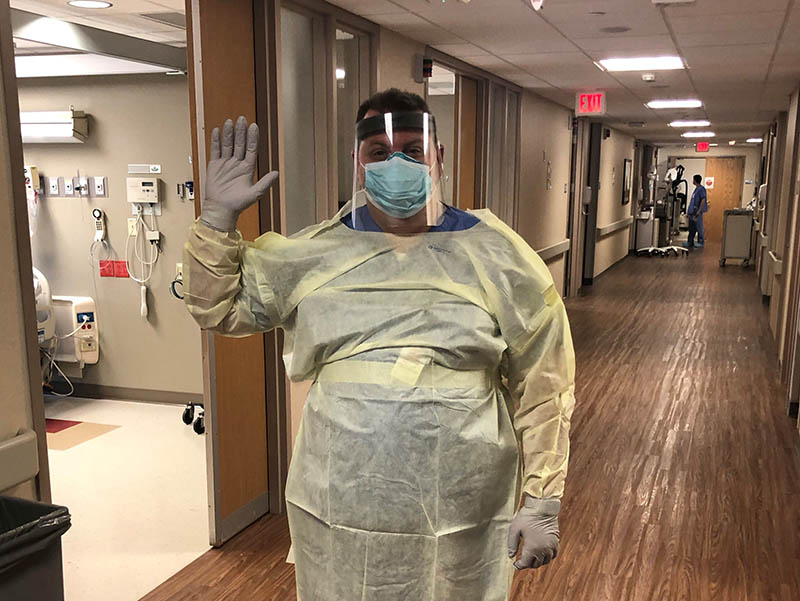For 18 days straight, Dr. Christopher Pribula worked in the COVID-19 unit of Sanford Broadway Medical Center in Fargo, North Dakota.
His shifts each day ranged from eight hours to 14. But the long shifts and consecutive days didn’t stop the hospitalist from providing the utmost care for patients, and neither did fear.
“I spent more time trying to educate myself and the people around me about what I was finding simply because there’s a lot of fear,” Dr. Pribula said. “You have to try to understand what’s going on and then get over that fear as much as you can because it can be paralyzing.”
Jumping in with two feet
Dr. Pribula’s typical hospitalist schedule consists of one week on, then one week off. In between, he does a teaching service. Another doctor had asked Dr. Pribula to switch with her because of a family emergency. Dr. Pribula obliged, even though it meant working three weeks in a row. He continued even after he found out the unit he would be working on was made into the COVID-19 unit.
“I just jumped in with two feet,” Dr. Pribula said. “There’s no hero involved; I’m just blazing a trail they’re going to follow. I set up my goal that we could design processes and systems that were going to take good care of the patients, protect us and make it easy to scale up and pass on to somebody else when my watch was at its end.”
Jane Taber and Amy Arel are nursing directors at the medical center. They both witnessed Dr. Pribula’s trailblazing firsthand.
“His skill level coming in and his knowledge about how diligent we need to be with the precautions was very helpful,” Arel said. “He brought in the person who was going to take over for him after 18 days and toured (the unit) and made sure it was a very thorough hand-off.”
The human side of medicine
For Dr. Pribula, however, blazing a trail means more than just precautions and skill levels. It means bringing back the human side of medicine, as he calls it.
Dr. Pribula was proud when one of his nurses sat with one of the patients who had become inconsolably panicked and delirious, prayed the rosary with her and played a few rounds of cards.
“Instead of reaching for a sedative, we reached for the softer skills of nursing,” Dr. Pribula said. “The patient calmed down.”
Dr. Pribula says those softer skills are the reason he went into medicine. He says those skills have been lost but are more important than ever, especially for patients who aren’t allowed to have visitors.
“We are their family now. We’re the ones that pay attention to them, we listen to them,” Dr. Pribula said.
Encouraging vulnerability
Taber and Arel attribute this viewpoint to his own nature.
“He is so genuine and down to earth,” Taber said. “He wasn’t afraid to be vulnerable.”
Dr. Pribula wasn’t afraid to admit that he was afraid, Taber and Arel say, but it allowed those he worked with to function better as a team and as care providers.
“He would say, ‘This is tough work, and you’re going to have tough days. Reach out. Talk to me, talk to your peers for support. If you’re not OK, it’s OK to admit that you’re not OK,’” Arel said. “He just created a really comfortable environment for staff to work in even though it’s a new, scary illness.”
Despite the fear, Dr. Pribula stresses the importance of education and making smart decisions — not just for yourself, but for those around you.
“Two of the patients I had had traveled and rolled the dice and didn’t take it seriously,” Dr. Pribula said. “I have one patient on the unit right now whose family traveled, came back and infected their entire family, and now their mom is intubated in the ICU.”
Dr. Pribula urges people to think before they act, especially when it comes to COVID-19.
“It’s not going to be something that people can just will away. We’re going to have to be smart about it,” Dr. Pribula said. “We have to protect ourselves for those in our community who can’t protect themselves.”
Educating the staff
This protection also applies to his staff, who he says uses a vigilant buddy system when gowning to ensure their safety when entering and leaving the COVID unit.
“He educated the staff,” Taber said. “He intentionally set up twice-a-day huddles, giving them updates on what we’re doing and really enforcing that our PPE is really the evidence of how we can keep ourselves safe.”
Dr. Pribula recognizes that many of his staff members and fellow doctors have families to go home to, and so does he. With a wife, a 12-year-old and a 10-year-old at home, Dr. Pribula took careful steps to keep his family healthy but didn’t let fear get in the way of going home.
“You’ve got to trust in that system of what you’re doing to protect yourself,” Dr. Pribula said.
That system includes his team at the special care unit, of which he says he is nothing without.
“I can’t say enough about the team — from the nurses to the aides, to Jane and Amy and our administrators, even down to the construction guys,” Dr. Pribula said. “They were all fighting for these patients.”
Dr. Pribula fought for the patients alongside them and set the standard in the COVID-19 unit of the Sanford hospital in Fargo. What Dr. Pribula wants people to know, however, is what the future can look like if we come together.
“We have to be patient, we have to be kind and we have to work together,” Dr. Pribula said. “If we do those things, we’re going to be OK.”
More stories
- Latest COVID-19 recommendations from Sanford Health providers
- Employee encouragement at Sanford, Good Samaritan Society
…
Posted In COVID-19, Sanford Stories
